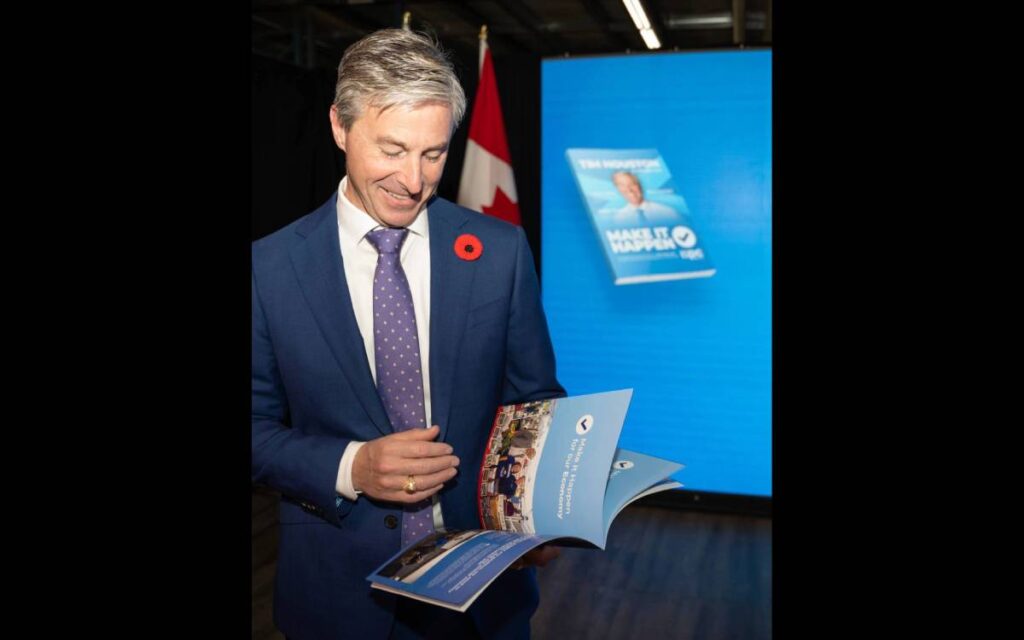
Houston’s PCs ended up winning a supermajority of seats. Pictured: Nova Scotia Premier Tim Houston. Photo Credit: Tim Houston/X.
Nova Scotia Premier Tim Houston opted to call an early election for Nov. 26, roughly eight months ahead of the fixed election date that had been earlier established by his own government. Election results this week indicate that this gamble paid off for the Nova Scotia Progressive Conservative Party, as they won an even larger majority government than they achieved in the previous election in 2021.
Houston ended up winning a supermajority of seats – 43 in a legislature of 55. The NDP also made notable gains, taking over the Official Opposition role from the provincial Liberals by winning nine seats, while the Liberals dropped from 16 seats in the previous legislature to two. During the past year, two Liberal members had crossed the floor to the Progressive Conservatives. There was also one independent candidate elected. The Liberal leader, Zach Churchill, lost his own seat in the virtual rout of the Liberal party. The issues that dominated the campaign were affordability, housing and health care, the same issues that are priorities in all parts of Canada. There were also some fisheries-related issues in the province regarding illegal fishing in the lobster industry.
Houston has been a balanced premier in his tenure to date, putting a focus on health care issues and hiring more doctors in the province. During this election, he committed to reducing the HST from 15 per cent to 14 per cent, eliminating the toll charges on Halifax bridges and making hospital parking free. He also said he would cap the increase in electricity rates to the national average and raise the minimum wage. Overall, Houston offered a platform based on staying the course from his first term in government, which clearly resonated with voters.
Many commentators are trying to read the tea leaves from this recent election in an attempt to gauge how Nova Scotia voters will lean federally. The Atlantic provinces are usually reliably Liberal, but there has been considerable dissatisfaction with the Trudeau government in recent years because of the carbon tax and voter fatigue with Trudeau in general. The recent election in New Brunswick resulted in a win for the provincial Liberal party over the incumbent Progressive Conservatives, but local Liberal leader Susan Holt chose to distance herself from the Trudeau government record and many of their policies.
Another strong victory for a provincial Conservative will pose yet another challenge for Trudeau. Houston has been an outspoken opponent of the carbon tax and other federal Liberal policies. Five Canadian provinces currently have Conservative governments – Ontario, Alberta, Saskatchewan, Nova Scotia and PEI. The relatively new BC Conservative party made a very strong showing in that recent election where the ruling NDP ended up with a razor-thin majority that could be challenged at any time.
The current Quebec government represented by the Coalition Avenir Quebec tends to lean toward more conservative policies but is currently being challenged by the Parti Quebecois, the separatist party. The next Quebec provincial election is scheduled for October 2026, by which time a federal election should have taken place and provincial party rankings may well shift.
It is widely expected that the Ontario Progressive Conservatives will opt to call an early election as well. Although the next Ontario election is not scheduled until June 2026, the Ford government has signalled that an election in the spring of 2025 is likely. That government’s recent announcement that they were sending out $200 cheques to Ontarians in the next few months was a key indicator. However, given the unpredictability of the timing of the next federal election and the fact that provinces will not want to have election dates that conflict leaves the actual timing uncertain for the moment.
One thing for sure is that Canadians will be facing a number of elections in the coming months that could substantially change Canada’s political landscape. The recent Houston re-election in Nova Scotia bucked the trend of incumbent governments being kicked out or seriously punished by the electorate that had happened in other jurisdictions. Considering the dire straits of the Canadian economy, threats from U.S. President-elect Donald Trump and serious instability globally, the stakes will be high for Canadians to be especially thoughtful to elect leaders that can handle these challenges.

She has published numerous articles in journals, magazines & other media on issues such as free trade, finance, entrepreneurship & women business owners. Ms. Swift is a past President of the Empire Club of Canada, a former Director of the CD Howe Institute, the Canadian Youth Business Foundation, SOS Children’s Villages, past President of the International Small Business Congress and current Director of the Fraser Institute. She was cited in 2003 & 2012 as one of the most powerful women in Canada by the Women’s Executive Network & is a recipient of the Queen’s Silver & Gold Jubilee medals.






